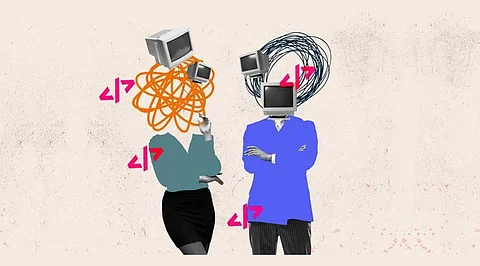

OpenAI has trained a model called ChatGPT which interacts in a conversational way. The dialogue format makes it possible for ChatGPT to answer followup questions, admit its mistakes, challenge incorrect premises, and reject inappropriate requests. ChatGPT is a sibling model to InstructGPT, which is trained to follow instructions in a prompt and provide a detailed response. Stack Overflow is also discussing posting content generated using other Artificial Intelligence tools that are similar to ChatGPT on its platform. It will frame a new policy soon with clarity on all these issues. Does that mean No-Code and Low-Code Platforms might disappear due to ChatGPT.
According to Stack Overflow's blogpost, getting a correct answer on ChatGPT is too low at the moment and it could also substantially harm the site and the users who are looking for the right answer. The blog post also writes that one concern is that many of the people posting the answers with the help of the AI chatbot have no real expertise in the subject.
Trained by AI and machine learning, the system is designed to provide information and answer questions through a conversational interface.
The AI is trained on a huge sample of text taken from the internet.
OpenAI said the new AI was created with a focus on ease of use. "The dialogue format makes it possible for ChatGPT to answer follow-up questions, admit its mistakes, challenge incorrect premises, and reject inappropriate requests," the research body said.
What are No-Code and Low-Code Platforms?
No-Code and Low-Code platforms are types of visual software development environments that allow enterprise developers and citizen developers to drag and drop application components, connect them together and create mobile or web apps. These platforms are often discussed synonymously with the development methods they embody.
No-Code and Low-Code platforms approach let professional developers quickly build applications by relieving them of the need to write code line by line. They also enable business analysts, office administrators, small-business owners and others who are not software developers to build and test applications. These people can create applications with little to no knowledge of traditional programming languages, machine code or the development work behind the platform's configurable components.
Join our WhatsApp Channel to get the latest news, exclusives and videos on WhatsApp
_____________
Disclaimer: Analytics Insight does not provide financial advice or guidance. Also note that the cryptocurrencies mentioned/listed on the website could potentially be scams, i.e. designed to induce you to invest financial resources that may be lost forever and not be recoverable once investments are made. You are responsible for conducting your own research (DYOR) before making any investments. Read more here.
